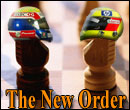
Atlas F1 GP Editor
Mark Webber's now confirmed long term deal with Williams has officially marked the Australian as one of the biggest hopes for the sport's future. Whether it's former World Champions Jackie Stewart and Niki Lauda or rivals Michael Schumacher and Jenson Button, Webber clearly enjoys an overwhelming support in the paddock for his talent and abilities. But without the results just yet, the 2005 season will be crucial for the making of the new boy wonder. Judging by the meticulous way he's gone about his job in the last few years, those who work with Webber have no doubt he will deliver. David Cameron talked to the men who know Webber best, and interviewed the rising star himself. Atlas F1 Exclusive
The recent announcement that Williams had signed Mark Webber to drive for the team for three years from 2005 may have surprised some of the fans of the sport, but those who have worked with the Australian in his almost three years as a racer in Formula One have never had any doubt about his abilities, in and out of the car.
"That's the difference," Stoddart, who was Webber's boss in his racing debut year at Minardi, in 2002, continues, "it's that total, total commitment in everything he does, whether it's the Olympic fitness level standards he achieves, whether it's the way that he cannot focus on anything else on his life - that's what makes a driver great. And obviously he has to have talent, but there's no doubt about that. I think Mark is going to go on to do some pretty great things - he needs a team that gives him a winning car, and I think Williams will do that. I can see that Mark will emerge as the most serious challenger for the World Championship, and I think he will achieve it."
But what is it that marks Webber out from the rest? What is it that has every single person asked about Webber looking for more superlatives? Everyone at Jaguar notes that he is particularly good at his job - the marketing people are happy to have someone as well presented as Webber; the physiotherapist notes his astonishing fitness; the race engineer states his feedback is precise and accurate. But, ultimately, these aren't the reasons why Webber is rated so high in the Formula One paddock.
As his manager Flavio Briatore succinctly notes: "it is always important what he does on the track, because in the end that's what it is about." And what Webber has been able to do on track, in a Minardi and a Jaguar, has been good enough to earn him a drive with the team that has the highest race winning average per start of them all, in the expectation that he will keep that record intact.
Against the Odds
Webber grew up in Queanbeyan, a small town notable only for being the last town on the way to Canberra, the capital of Australia which was built between Sydney and Melbourne when neither city would agree on the other becoming the nation's capital. His father Al owned, and owns, a small Yamaha bike store which gave the young Mark access to the minibikes which were his access to the world of speed that drew him away from rugby, cricket and the other, more usual, Australian sports.
Getting his first kart at the age of fourteen Webber quickly discovered the world he was to focus on, and progressed through the various levels of competitions, winning the New South Wales Karting Championship in 1993 which, ironically, has proven to be the last championship he has won, so far. He then moved up to cars the next year, competing in Australian Formula Ford, but more importantly he met the person who was to have the biggest influence on his career, and perhaps his life Ann Neal.
Neal was the first person to see the true potential in Webber, and as his personal manager and mentor she was able to convince him that his future lay in a move to Britain. "We had a plan," Webber reflects back on the time, "in 1995 we wrote a plan that we wanted to be in Formula One in 2001, to take sort of six or seven years to get into Formula One, and we were one year out. But it's very easy to have a plan on a piece of paper!"
"I suppose it started to kick in around Formula 3," Webber recalls, "thinking 'okay, this is quite a serious category, there are some serious drivers here, and if you start to go well in that then maybe you can be alright' Formula Ford is maybe a little early." Five podiums, including another win at Brands Hatch, put him first of the privateer' drivers in the Championship, behind the two Stewart drivers and between the two Promotecme Renaults.
Another podium, this time at the Marlboro Masters in Zandvoort, drew the attention of Mercedes, who were in the process of restarting the programme that had previously pushed Michael Schumacher, Heinz Harald Frentzen and Karl Wendlinger all the way up to Formula One. The chance to finally make a living from the sport, as well as to follow in the footsteps of Schumacher himself, the man he admired more than anyone in motorsport, was too good to ignore. 1998 saw Webber competing in the FIA GT Championship, which came down to the final round, with Webber finishing eight seconds behind then-teammate Ricardo Zonta.
"But you've still got a number of obstacles after that," Webber says. "A lot of hurdles that you're faced with, and yeah, you've got to stick to a plan there were a few derailings happen!"
Remaining with AMG Mercedes the next year, this time as team leader, gave Webber the opportunity of competing at the Le Mans 24 Hour race, a dream which turned to a nightmare as his car somersaulted twice in practice. Thinking it was Webber's fault, the team entered the race, remaining until his teammate also somersaulted five hours in; they withdrew the remaining car immediately in disgrace.
Turning their back on sports cars, Neal took Webber to Silverstone and introduced the driver to fellow countryman Paul Stoddart - then in his first year in Formula 3000 with European Formula Racing. It was to be a fortuitous meeting for both men. "We agreed to a first Pembrey test," Stoddart notes, "and you could just see there was something there, that this guy was good." Webber got the drive for 2000.
"It was only our second year in the Championship and he took us to third place," Stoddart recalls, "and third place in the Championship in those days was a serious achievement because the teams were so much more competitive than they are now, and there were so many more teams. Mark showed something that only comes along every now and again, which is a special talent."
At the start of the year the team had linked with the Arrows Formula One outfit, with an option of Webber's services, but the relationship between team bosses soured and a test drive never came to fruition. At this time, Benetton came into the picture.
"Everybody knows I had a few run ins with Tom [Walkinshaw] that year," Stoddart explains. "Mark had a tough choice to make, together with Ann and his father, about whether to go with Flavio or to stay it alone. I wasn't so sure it was [the right thing to do] at the time, but it has turned out to be the right choice."
Webber signed a contract with Briatore as his contract manager, and with that came a test drive at Benetton and a race seat with Super Nova in Formula 3000. Webber claimed three race wins and second in the Championship.
"He had a good year - he didn't win the Championship, but it's very difficult when you are doing serious testing in a Formula One car," Stoddart says. "People don't realise how difficult it is to jump between a Formula 3000 and a Formula One car - it's not so easy, and he did a very creditable job, but he just didn't have the luck." He was, however, gaining vital experience for the next step up, and in September 2001 he was talking to Stoddart, who had now taken over perennial back markers Minardi, about a seat for the following year.
As had been the case throughout his career, a lack of financial backing was a hindrance. "Certainly by the time we were talking seriously about getting him a Formula One drive the issue was that we obviously needed drivers to bring a budget," says Stoddart. "Mark was probably a special case, and will probably be the last driver that gets a free run into Formula One, but that was a bit of a special relationship and it took a lot of people to want it to happen."
The deal was done, with a lot of backroom deals between Stoddart and Briatore, and for the first time since the event to Melbourne, there would be an Australian on the grid at the season opening Australian Grand Prix. "Mark repaid all that faith in him ten times over," Stoddart concludes. "He did it in the first race, basically!"
That First Race
"He's just not had the car," Stoddart clarifies. "You only had to look at who scored all the points at Jaguar last year - that wasn't a shot at Justin [Wilson], who scored that point at Indy but Mark is worth a second in that car, and he did things in that car that, if everyone is absolutely bluntly honest, the car was probably not capable of doing. And that's the difference between a good and great driver a great driver will make things happen, make opportunities through his own talent that probably wouldn't naturally exist.
"People don't have to win races to be seen as a future champion those of us in the pitlane who look out for certain things, you see it when it comes along, and with Mark it's the total package."
Stoddart may have been the first in Formula One to notice Webber's abilities, but he was far from the last. Niki Lauda, then team principal at Jaguar, had ample opportunity to notice the Australian's antics in the black car more often than not he was ahead of the green cars under the Austrian's control. And there was one element that attracted Lauda's attention, above all: "His speed. We let him test the car, I think it was in Barcelona, and he was doing very good lap times - this was the major decision.
"He's a perfect guy altogether - he's very good for sponsors, he's a very polite guy, well educated - so the whole package of him is very good. But the only reason we took him [for Jaguar] was his speed."
Jaguar have had two podiums in their existence - in the 2001 Monaco GP, when Eddie Irvine managed to be one of four drivers on the lead lap, and in Monza 2002, rather fortuitously the week before a major review within Ford was to be released on the future of the team. But if Webber was able to take the fight to Jaguar in a Minardi, then surely the expectations must have been high when he joined the green team?
"He lived up to my expectations," Lauda notes, "but the Jaguar team went backwards. So therefore he cannot prove it, but from his point of view he's doing a really good job, and if the car can't deliver what it's supposed to deliver then he's in difficulties. Because in the beginning of (this) season he was very quick, the car was quick, but now the other cars have gone forward and the Jaguar cars have stopped [progressing]. So therefore they are going backwards and it doesn't really help him."
The view from Jaguar
"He's got a very good working relationship with his race engineer, which is essential - I think he's got a lot of respect for his engineer, he pushes him quite a lot, expects a lot from him. Mark's got a lot of good feedback from the car - between him, his engineer and his data analyst, the three of them work very well together, and get the best out of the car and the package that we've got. So he's got a hell of a lot of determination for sure, a lot of natural talent, but I think it's very much the way that he works with people, the way that he motivates people and the whole team.
"He'll be back at the factory most weeks after a race, talking to the design guys and that kind of thing, going through what he thinks we need from the car, and particularly back at the factory he has a lot of talks with the engineers to discuss what they are doing for the next race. Now I know a lot of drivers don't do that - with a lot of Formula One drivers, you don't see them in the engineering office between races. It's just the effort that he puts in on all sides of the operation, really."
Nick Harris, the team physiotherapist, is effectively Webber's human engineer, and for him the difference is simple: "In terms of what I do, the human element, it really is when the drivers are on their own at their homes and if I'm not there, or another person like me in the teams Mark's been with, it's just the desire to wake up in the morning, to open the window and see the shocking English weather, all cloudy and wet, and yet still have the motivation to go out and to complete maybe a three or four hour session on the bicycle.
"That's very special, to have that level of motivation no matter what the weather, to just go out if no one's with you to push you, to complete those sessions. That's what we call the hard yards - it's always easier to go out when the weather's fine, when there's a group of you, whether I'm there or you're with friends or in training camp. But when it's a cold, wet day in England and you're a bit tired, to go out on your own steam and do a three or four hour session, those days add up over a season and make a big difference.
"And when you go from season to season then yeah, that makes him pretty special in my book you've got your fair weather kind of athletes, and you've got the guys who do the fair weather stuff and the hard yards, and the hard yards make the difference."
Bjorn Wirdheim, the team's reserve driver and a man who has been able to observe the Australian at close quarters, notes it all rather succinctly: "I think one of his strongest abilities is to go out and post a good lap time when the pressure is on, and I think that's what makes him a good qualifier. And also the way he works with the team it doesn't matter who you ask here at Jaguar, they really like him and that's important. He also has an image of a super professional he puts a huge effort into his training. And all of that gives him a very positive image."
How long did it take the team to realise what they had on their hands? Peter Harrison, who has been Webber's race engineer since the Australian joined the team, remembers the initial period thus: "the obvious thing that I remember was we knew he was going to be easy to get on with - we thought he's going to fit in, that side of it was going to be great but the pace side we had no idea. We just thought, 'well maybe he's going to be quick, maybe he's not, we just don't know'. So I was just open minded I didn't really have a view on him at that stage.
"We did plenty of testing, and even then it wasn't obvious at that time, Antonio [Pizzonia] was slightly quicker in the winter, and Mark just built up slowly. He didn't show any obvious pace until we actually got down to Australia. It only really became obvious once we got into the race season. I think it's just the way he reacts to a race weekend with Antonio he struggled with a race weekend, with the pressure side of it.
"Testing is a completely different ball game and Mark, because he stays so calm and relaxed, the pressure [of a GP weekend] doesn't get to him in the same way. During testing he would be really calm and really relaxed, and I was thinking during testing how's he going to relate to a race weekend?' you've seen it before, some drivers just change and we went to the race weekend and he had exactly the same attitude. And I thought: this is great, he doesn't turn up on Sunday all uptight, you can still talk to him some drivers you can't even talk to them before the race. Mark just stays the same it's great."
The Racing Difference
"He does do that, yeah," Stubbs responds, "I would agree entirely, and I would say his engineer is also like that. Now whether that comes from Mark or not, I don't know, but certainly as a team they do work like that. I wouldn't say the other side of the garage doesn't, but you certainly notice it on Mark's side of the garage. I think it's the sort of natural way he works it was like that from the very beginning, and as soon as he built up relationships with people it obviously accumulated and progressed from that."
"I think it's all down to the pressure," Harrison continues, "he's really into his sports and he loves his cycling, and he likes the mental side of it, the mental toughness. I think instead of taking pressure off he actually likes it, he likes the mental hardship it's like when he did his challenge in Tasmania last winter, he loves pushing himself to the edge, and that's when he's at his best, I think. Certainly in testing when that pressure's not there, he still does a great job but you don't have that last edge, whereas on a race weekend he'll always find those last couple of tenths when it really counts.
"He just has the ability to do it, and I think it's a snowball effect as well once you do it a couple of times and get your confidence, then he arrives with that confidence certainly last year Antonio would arrive almost beaten you could see it and Mark would arrive knowing that he was going to build up. I think it's a mental attitude, I think if you think 'right, I'm going build up on the Friday, I'm going to do the test', and by qualifying on Saturday you think 'right, I'm going to peak, I'm going to do my best lap when it really matters', and if you have that attitude all weekend it works out."
If he has the right approach, loves the pressure and thrives in the environment, then where are the results? Stoddart mentioned that he hasn't had the car, and Lauda agreed that his team had gone backwards relative to everyone else, but what is the view of the man closest to him in the paddock? "I think that he is a very good racer," Harrison replies, "but he's been let down by the car or by circumstances outside of his control really, most of the time.
"We've had some incredible bad luck, like you wouldn't believe - we've run in quite strong positions, point-scoring positions, and normally at the time when we've got the most to gain, the car has broken. And when we've slogged around just slightly off the pace and finished ninth or tenth, he's driven a fantastic race but we just haven't had the pace. When we have had the pace, like Malaysia where we had a terrible start, or Monaco where we had the electrical problem, they would have been both possible podiums, and it's just really bad luck.
"I don't think it's anything Mark's done he's very consistent in a race, and in his lap times I think that [results] will come. If you actually analyse his race runs they've been rock solid, and he makes very few mistakes there was Brazil [last year] in the wet [where Webber spun and crashed], which I guess was a mistake, but an easy one to make and nothing to be ashamed of. But other than that, it's hard to think of many mistakes that he's made in races. But I can think of dozens of times where the car has let him down just at the wrong time, and you really feel for him. You could probably re-run the last two seasons and we would score a lot more points now."
Looking Ahead
"He's a completely straight forward guy, very easy to handle, no primadonna guy, down to earth, professional, highly professional attitude - nothing wrong with him. It only proves that I was right with my decision, that Frank [Williams] thinks the same way and brings him up to a better team - that really is a fact, so it is a very good move for him. I would say his Jaguar start, after Minardi, was the right step forward to join a number one team, or one of the top teams."
And he will now find himself at a team that has much more resources than he has been used to, which is probably an ideal situation for the man who has been slowly building up to this shot at the big time. "When he came [to Jaguar], you could see that he had a good relationship at Minardi," Dave Stubbs remembers, "and he knew their restrictions or limitations, and I think he knows our limitations just the same. But he realised what they are and, I wouldn't say he works around them, but he encourages the team to do the job despite those limitations.
"He's done an awful lot for the Jaguar team a hell of a lot. He makes the team work together as a whole he's in there in qualifying, he's a good qualifier, a good racer he's an ideal number one driver for the team as we are at the moment, I think."
"I think I have to say one thing at the end, though," Stoddart interjects, knocking on the table for emphasis. "Quite aside from his unbelievable talent, quite aside from the fact that I believe everyone now recognises that he's a future race winner and maybe even Championship winner - but the one thing that sets Mark out from the rest is that his feet are firmly on the ground, and he's one hell of a nice guy.
"He's a bit like Michael Schumacher - people criticise Michael, but Michael is actually a bloody nice guy, and I just see so many similarities between them. Let's hope I'm right."
Mark Webber himself struggles for words when asked to explain the successful image he holds in Formula One nowadays.
"I don't think...", he begins, hesitating,"it's hard to talk about why things have gone the way they have in Formula One so far... I've worked hard, I suppose. I've still got so much more to achieve. I've got good people around me, and that's been really helpful to me - just hard work, and keeping it simple."
DC: How do you approach this whole job? Do you see your approach as having changed over the last few years?
Webber: "No, not really - it's very similar to when I was at Minardi, even though I've got to be more in touch than when I was at Minardi, because Minardi had less resources - you can't be so demanding on a small team like that because they don't have the resources, but they have a phenomenal amount of passion and it was a great thing for me to learn there. But no, not a huge amount has changed at all, it's been very, very consistent all the way through, and that's what they say, if it's not broken, don't change it. "
DC: Have you ever had a game plan to plot out the moves - coming over to England, moving through the series, and so on?
Webber: "We had a plan - in 1995 we wrote a plan that we wanted to be in Formula One in 2001, to take sort of six or seven years to get into Formula One, and we were one year out. But it's very easy to have a plan on a piece of paper - we can all draw a plan! I suppose it started to kick in around Formula 3, thinking 'okay, this is quite a serious category, there are some serious drivers here, and if you start to go well in that then maybe you can be alright' - Formula Ford is maybe a little early.
"But you've still got a number of obstacles after that, a lot of hurdles that you're faced with, and yeah, you've got to stick to a plan - there were a few derailings happen! But everything happens for a reason, and you've got to grab the opportunities that come along with both hands in any sport. I've been very fortunate, but also I've had to perform on certain occasions very quickly to keep myself in the hunt."
DC: You've worked hard, and you've surrounded yourself with good people, but how has that worked out? You can't just luck into having good people with you all along.
Webber: "Well, I think there are a lot of really good people out there, but you've also got to get the best out of them yourself as well. I think respect breeds success and that breeds respect as well, so if you've got respect for each other, that does help the whole train to go forward. If there's a bit of a breakdown, or if I'm going to bark off up a tree and say I really, really want something and then if I can't actually deliver after they've got it for me... I've got to actually deliver on demand, basically, so delivering for the team is crucial."
DC: Everyone says that you work hard but also that you push them to work possibly harder than they knew they could - how do you see that from your side?
Webber: "Some people might just do enough, but just enough is not enough - you need to do more. There are a lot of people who are just happy to do enough - it doesn't matter what walk of life you're in - like I say if you give some people wings they can actually get some confidence, and I've seen some people at this team change since I've arrived, just in terms of their own confidence, and I've probably changed as well because we've both grown together, but there were some guys here who were very... they probably wouldn't express themselves enough, but now they do because they trust themselves, they back their own judgments."
DC: How much do you think you've changed in the last two years?
Webber: "Not a great deal - just probably a bit more confidence, in my own driving, but I'm still absolutely open to learn. I mean, on Friday at Silverstone I didn't drive that well, but on Saturday I came out and was really happy with how I drove, and I worked really hard over night.
"Here again [at Hockenheim practice] maybe I could have gone a bit better, but it's all about putting it in the library, putting it in the computer for next time. Every dog has his day, and you've got to learn that - in this sport there are more downs than there are ups, unless you're Michael [Schumacher], but for most people it's a tough industry, and there are a lot of variables that are outside of the driver's control, and you just got to try and control as much as you can.
"Talent is great to have, but there are so many things kicking off around the driver now over the course of a weekend that he has to do, or over the course of his career - testing, all the travel - it's about focusing your energy on the right things, and not wasting it on things that don't make a difference."
"There are only two drivers in this paddock who are the total package," Minardi's Paul Stoddart states. One of them is, of course, Michael Schumacher "clearly the greatest of all times whether people want to believe it or not, it's a simple fact of life." And the other?
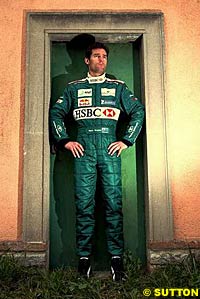 "And the only other person who is 110%, who lives, breathes and thinks Formula One, Formula One, Formula One is Mark Webber."
"And the only other person who is 110%, who lives, breathes and thinks Formula One, Formula One, Formula One is Mark Webber."
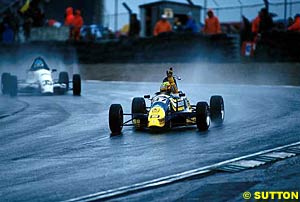 Neal and Webber moved to Britain and started knocking on doors. Over the next couple of years he would sign with the Van Diemen team and win the Formula Ford Festival, come second in the British and third in the European Formula Ford Championships, and win on debut at Spa. Testing for Alan Docking Racing ten days after winning the Festival, he impressed the team boss enough to be signed as the team leader for 1997 in Formula 3, with two inexperienced Japanese drivers alongside him, despite only having a small amount of support from Yellow Pages Australia.
Neal and Webber moved to Britain and started knocking on doors. Over the next couple of years he would sign with the Van Diemen team and win the Formula Ford Festival, come second in the British and third in the European Formula Ford Championships, and win on debut at Spa. Testing for Alan Docking Racing ten days after winning the Festival, he impressed the team boss enough to be signed as the team leader for 1997 in Formula 3, with two inexperienced Japanese drivers alongside him, despite only having a small amount of support from Yellow Pages Australia.
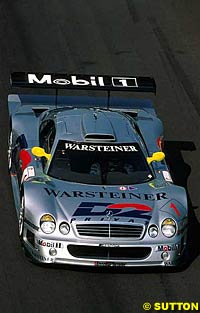 "But everything happens for a reason, and you've got to grab the opportunities that come along with both hands in any sport," the Australian says. "I've been very fortunate, but also I've had to perform on certain occasions very quickly to keep myself in the hunt."
"But everything happens for a reason, and you've got to grab the opportunities that come along with both hands in any sport," the Australian says. "I've been very fortunate, but also I've had to perform on certain occasions very quickly to keep myself in the hunt."
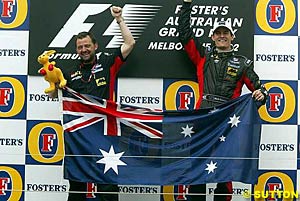 In his first ever Formula One race, Mark Webber fought, pushed and struggled his Minardi up from eighteenth on the grid to fifth at the chequered flag in an incident packed race, bringing the team their first points since 1999 and becoming the 51st driver (and first Australian) to collect points on their Formula One debut. Which was a fairy tale result for both team and driver, but it also remains his best result in the series so far.
In his first ever Formula One race, Mark Webber fought, pushed and struggled his Minardi up from eighteenth on the grid to fifth at the chequered flag in an incident packed race, bringing the team their first points since 1999 and becoming the 51st driver (and first Australian) to collect points on their Formula One debut. Which was a fairy tale result for both team and driver, but it also remains his best result in the series so far.
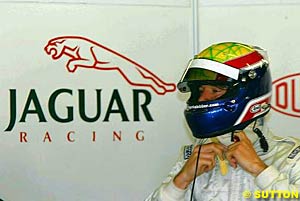 "He's obviously got a lot of natural talent, hasn't he?" Jaguar's team manager Dave Stubbs starts, when asked about what sets Webber apart from the others. "But apart from that he works with every aspect of the team well, from the media people, mechanics, engineers, myself, chief engineer, the people who work at the factory, everybody he seems to kind of fit in like no other driver I've ever known before, really.
"He's obviously got a lot of natural talent, hasn't he?" Jaguar's team manager Dave Stubbs starts, when asked about what sets Webber apart from the others. "But apart from that he works with every aspect of the team well, from the media people, mechanics, engineers, myself, chief engineer, the people who work at the factory, everybody he seems to kind of fit in like no other driver I've ever known before, really.
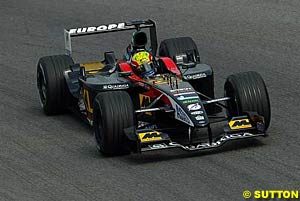 Two years ago, at the Italian Grand Prix, I spent a practice session in the Minardi garage, and standing in front of the spare car between the two drivers, it was immediately obvious how different Webber's approach to a Grand Prix weekend was: while the other side of the garage was a blur of frantic movement back and forth, Webber's side was serene, deliberate, with not a moment wasted or a gesture unnecessary. Everything that his side of the garage did just seemed methodical and calm.
Two years ago, at the Italian Grand Prix, I spent a practice session in the Minardi garage, and standing in front of the spare car between the two drivers, it was immediately obvious how different Webber's approach to a Grand Prix weekend was: while the other side of the garage was a blur of frantic movement back and forth, Webber's side was serene, deliberate, with not a moment wasted or a gesture unnecessary. Everything that his side of the garage did just seemed methodical and calm.
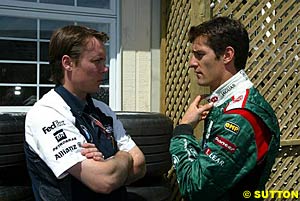 With the move to Williams, Webber will find himself even more in the public eye, and the pressure to perform will be severe against men who have big reputations in racing. Niki Lauda, for one, is looking forward to seeing him in action there. "Webber is from the young generation guys," Lauda states, "so I have to compare him with [Kimi] Raikkonen, [Fernando] Alonso, these types of guys - he's certainly one of them. So what I expect him to do is to really fulfill the promise. This he has not delivered yet and this is something very interesting for me to watch, now that he is in the number one group of cars, where will he end up.
With the move to Williams, Webber will find himself even more in the public eye, and the pressure to perform will be severe against men who have big reputations in racing. Niki Lauda, for one, is looking forward to seeing him in action there. "Webber is from the young generation guys," Lauda states, "so I have to compare him with [Kimi] Raikkonen, [Fernando] Alonso, these types of guys - he's certainly one of them. So what I expect him to do is to really fulfill the promise. This he has not delivered yet and this is something very interesting for me to watch, now that he is in the number one group of cars, where will he end up.
Sidebar: In his Words
|
Contact the Author Contact the Editor |
Please Contact Us for permission to republish this or any other material from Atlas F1.
|
Volume 10, Issue 31
Atlas F1 Special
The Stars Align
Boy Wonder
In Search of the Holy Grail
Chemistry Cocktail
The Conservative Party
The Reshuffle: Facts & Stats
The Reshuffle Trivia Quiz
Columns
On The Road
Elsewhere in Racing
The Weekly Grapevine
> Homepage |
